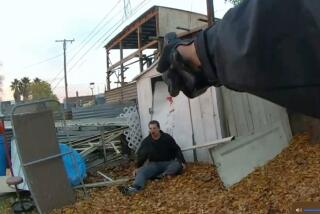Plaintiff in Oakland Police Abuse Case Is Killed
- Share via
A 19-year-old Oakland man who was recently awarded more than $100,000 in a civil settlement of “the Riders” police corruption case has been killed in an apparent carjacking.
Matthew Watson was shot about 9 a.m. Tuesday on Chester Street in West Oakland. He was transported to Highland Hospital where he was pronounced dead, police said.
Watson’s 1990 gray Cadillac Seville was taken from the scene of the shooting, according to Sgt. Brian Medeiros of the Oakland Police Department’s Homicide Division. The car was found abandoned Wednesday afternoon by police in nearby Richmond.
Police offered few other details of the killing and would not comment on whether Watson’s killers had targeted the young man specifically.
John Burris, the lawyer who represented Watson -- as well as scores of other plaintiffs -- in the police corruption case, said Watson may have been killed because of the settlement money he received.
“I had been warning him that when he got the money, people were going to know,” Burris said in a phone interview.
Watson had testified in the criminal trial against now-fired Oakland police officers Clarence Mabanag, Jude Siapno and Matthew Hornung. Dubbed “the Riders,” the three have been charged with the kidnapping, assault and false arrest of suspected drug dealers in West Oakland in 2000. A fourth officer, Frank Vazquez, is thought to have fled to Mexico to avoid the charges against him. The jury in the Riders trial is in its third week of deliberations.
Burris said the former officers picked Watson up off the street, took him to an isolated location and beat him before arresting him on drug possession charges. Watson suffered a badly blackened eye and swollen face at the hands of the accused officers, said Burris, adding that Watson spent several days in jail on the drug charges.
The attorney said it appeared that Watson was killed over a car he purchased with money that he received from the police corruption settlement.
“He didn’t have any other money,” Burris said. “He had wanted to buy a car; it was a big deal for him.”
Given Watson’s young age, Burris considered him to be the most vulnerable of all the plaintiffs in the Riders case, but he also thought Watson might have had a brighter future ahead.
Burris said he had formed an especially close father-and-son like relationship with the young man who, Burris said, had lived an “unstable” and “harsh” life.
“I would take him for a meal at McDonald’s and he would point out the drug dealers,” Burris said. “He would say, ‘I can’t even leave my house.’ ”
Burris said he had encouraged Watson to pursue an education and enroll in the military.
“I thought he had a chance to make it -- to survive -- and to get out of his community,” Burris said. “But he just couldn’t see himself beyond Oakland, or even beyond West Oakland.”
More to Read
Sign up for Essential California
The most important California stories and recommendations in your inbox every morning.
You may occasionally receive promotional content from the Los Angeles Times.














